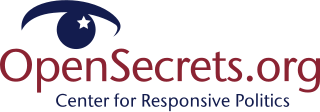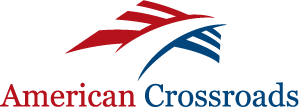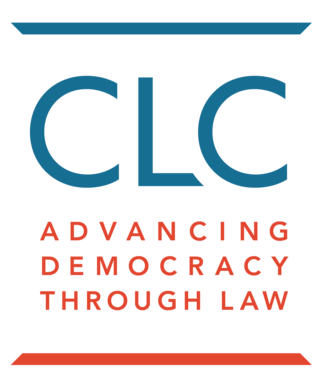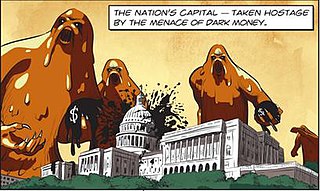Related Research Articles

Campaign finance laws in the United States have been a contentious political issue since the early days of the union. The most recent major federal law affecting campaign finance was the Bipartisan Campaign Reform Act (BCRA) of 2002, also known as "McCain-Feingold". Key provisions of the law prohibited unregulated contributions to national political parties and limited the use of corporate and union money to fund ads discussing political issues within 60 days of a general election or 30 days of a primary election; However, provisions of BCRA limiting corporate and union expenditures for issue advertising were overturned by the Supreme Court in Federal Election Commission v. Wisconsin Right to Life.
In the United States, a political action committee (PAC) is a tax-exempt 527 organization that pools campaign contributions from members and donates those funds to campaigns for or against candidates, ballot initiatives, or legislation. The legal term PAC was created in pursuit of campaign finance reform in the United States. Democracies of other countries use different terms for the units of campaign spending or spending on political competition. At the U.S. federal level, an organization becomes a PAC when it receives or spends more than $1,000 for the purpose of influencing a federal election, and registers with the Federal Election Commission (FEC), according to the Federal Election Campaign Act as amended by the Bipartisan Campaign Reform Act of 2002. At the state level, an organization becomes a PAC according to the state's election laws.
A 527 organization or 527 group is a type of U.S. tax-exempt organization organized under Section 527 of the U.S. Internal Revenue Code. A 527 group is created primarily to influence the selection, nomination, election, appointment or defeat of candidates to federal, state or local public office.
Common Cause is a watchdog group based in Washington, D.C., with chapters in 35 states. It was founded in 1970 by John W. Gardner, a Republican, who was the Secretary of Health, Education, and Welfare in the administration of President Lyndon Johnson as well as chair of the National Urban Coalition, an advocacy group for minorities and the working poor in urban areas. In its early days, Common Cause focused its efforts on ending the Vietnam War and lowering the voting age from 21 to 18.
A publicly funded election is an election funded with money collected through income tax donations or taxes as opposed to private or corporate funded campaigns. It is a policy initially instituted after Nixon for candidates to opt into publicly funded presidential campaigns via optional donations from tax returns. It is an attempt to move toward a one voice, one vote democracy, and remove undue corporate and private entity dominance.

OpenSecrets is a nonprofit organization based in Washington, D.C. that tracks and publishes data on campaign finance and lobbying, including a revolving door database which documents the individuals who have worked in both the public sector and lobbying firms and may have conflicts of interest. It was created from the 2021 merger of the Center for Responsive Politics (CRP) and the National Institute on Money in Politics (NIMP), both of which were organizations that tracked data on campaign finance in the United States and advocated for stricter regulation and disclosure of political donations.
A 501(c) organization is a nonprofit organization in the federal law of the United States according to Internal Revenue Code. Such organizations are exempt from some federal income taxes. Sections 503 through 505 set out the requirements for obtaining such exemptions. Many states refer to Section 501(c) for definitions of organizations exempt from state taxation as well. 501(c) organizations can receive unlimited contributions from individuals, corporations, and unions.

The financing of electoral campaigns in the United States happens at the federal, state, and local levels by contributions from individuals, corporations, political action committees, and sometimes the government. Campaign spending has risen steadily at least since 1990. For example, a candidate who won an election to the U.S. House of Representatives in 1990 spent on average $407,600, while the winner in 2022 spent on average $2.79 million; in the Senate, average spending for winning candidates went from $3.87 million to $26.53 million.
A 501(c)(3) organization is a United States corporation, trust, unincorporated association or other type of organization exempt from federal income tax under section 501(c)(3) of Title 26 of the United States Code. It is one of the 29 types of 501(c) nonprofit organizations in the US.
Americans for Prosperity (AFP), founded in 2004, is a libertarian conservative political advocacy group in the United States affiliated with brothers Charles Koch and the late David Koch. As the Koch family's primary political advocacy group, it has been viewed as one of the most influential American conservative organizations.
A nonpartisan organization, in American politics, is a non-profit organization organized United States Internal Revenue Code that qualifies certain non-profit organizations for tax-exempt status because they refrain from engaging in certain political activities prohibited for them. The designation "nonpartisan" usually reflects a claim made by organizations about themselves, or by commentators, and not an official category per American law. Rather, certain types of nonprofit organizations are under varying requirements to refrain from election-related political activities, or may be taxed to the extent they engage in electoral politics, so the word affirms a legal requirement. In this context, "nonpartisan" means that the organization, by US tax law, is prohibited from supporting or opposing political candidates, parties, and in some cases other votes like propositions, directly or indirectly, but does not mean that the organization cannot take positions on political issues.

American Crossroads is a US Super PAC that raises funds from donors to advocate for certain candidates of the Republican Party. It has pioneered many of the new methods of fundraising opened up by the Supreme Court's ruling in Citizens United. Its president is Steven J. Law, a former United States Deputy Secretary of Labor for President George W. Bush and the Chairman of the Board of Directors is former Republican National Committee chairman Mike Duncan. Advisers to the group include Senior Advisor and former White House Deputy Chief of Staff Karl Rove and former Mississippi Governor Haley Barbour.

Americans for a Better Tomorrow, Tomorrow was a United States political action committee (PAC) established by Stephen Colbert, who portrayed a character of the same name who was a mock-conservative political pundit on Comedy Central's satirical television series The Colbert Report. As a super PAC the organization could raise unlimited sums of money from corporations, unions and other groups, as well as wealthy individuals. Speaking in character, Colbert said the money would be raised not only for political ads, but also "normal administrative expenses, including but not limited to, luxury hotel stays, private jet travel, and PAC mementos from Saks Fifth Avenue and Neiman Marcus."

Campaign Legal Center (CLC) is a nonprofit 501(c)(3) government watchdog group in the United States. CLC supports strong enforcement of United States campaign finance laws. Trevor Potter, former Republican chairman of the Federal Election Commission, is CLC's founding president.
The term corporate donation refers to any financial contribution made by a corporation to another organization that furthers the contributor's own objectives. Two major kinds of such donations deserve specific consideration, charitable as well as political donations.

Trevor Alexander McClurg Potter is an American lawyer who served as the former commissioner and chairman of the United States Federal Election Commission. He is the Founder and President of the Campaign Legal Center, a nonprofit organization which works in the areas of campaign finance and elections, political communication and government ethics. A Republican, he was the General Counsel to John McCain's two presidential campaigns. Potter is a vocal critic of unlimited corporate spending and dark money in politics allowed by the Supreme Court of the United States' Citizens United v. FEC ruling.

In politics, particularly the politics of the United States, dark money refers to spending to influence elections, public policy, and political discourse, where the source of the money is not disclosed to the public.

Mayday PAC is an American crowd-funded non-partisan Super PAC created by Harvard Law School professor and activist Lawrence Lessig. Its purpose is to help elect candidates to the Congress to pass campaign finance reform. It is notable for raising large sums from numerous contributors in a short span of time – nearly $11 million in 2014 – and was described in the Los Angeles Times as the "super PAC to end all super PACs." The group spent over $10 million in the November 2014 elections, but its strategic plan of electing candidates friendly to campaign finance reform failed.

The American Anti-Corruption Act (AACA), sometimes shortened to Anti-Corruption Act, is a piece of model legislation designed to limit the influence of money in American politics by overhauling lobbying, transparency, and campaign finance laws. It was crafted in 2011 "by former Federal Election Commission chairman Trevor Potter in consultation with dozens of strategists, democracy reform leaders and constitutional attorneys from across the political spectrum," and is supported by reform organizations such as Represent.Us, which advocate for the passage of local, state, and federal laws modeled after the AACA. It is designed to limit or outlaw practices perceived to be major contributors to political corruption.
Issue One is an American nonprofit organization that seeks to reduce the role of money in politics. It aims to increase public awareness of what it views as problems within the present campaign finance system, and to reduce the influence of money in politics through enactment of campaign finance reform.
References
- 1 2 Montgomery, David (September 19, 2014). "Ad campaign attacks Rounds over EB-5 program". Argus Leader. Retrieved 26 May 2015.
- ↑ Gold, Matea (April 19, 2015). "Big money in politics emerges as a rising issue in 2016 campaign". Washington Post. Retrieved 26 May 2015.
- ↑ "IRS Form 990 2013" (PDF). GuideStar. Internal Revenue Service. Retrieved 26 May 2015.
- 1 2 Blumenthal, Paul (August 1, 2014). "Campaign Finance Reformers Regroup With New Goal: To 'Win The Debate On Solutions'". Huffington Post. Retrieved 26 May 2015.
- ↑ Meet the Liberals Who Think Trump's Good For Democracy; Politico ; July 28, 2015
- 1 2 "A Sour Note From 'Every Voice'". FactCheck.org. Annenberg Public Policy Center. August 1, 2014. Retrieved 26 May 2015.
- ↑ Berman, Ari (May 19, 2015). "How the Money Primary Is Undermining Voting Rights". The Nation. Retrieved 26 May 2015.
- ↑ Harding, Robert (October 15, 2014). "Every Voice, pro-campaign finance reform group, unveils two mailers targeting John Katko". The Citizen. Retrieved 26 May 2015.
- ↑ Newlin Carney, Eliza (October 28, 2014). "Republicans Join Attacks on Big Money". Roll Call. Retrieved 26 May 2015.
- ↑ Confessore, Nicholas (July 28, 2014). "Spending Big to Fight Big Donors in Campaigns". New York Times. Retrieved 26 May 2015.
- ↑ About Us [usurped] ; Public Campaign website; April, 2015
- ↑ "Board of Directors and Funders". Archived from the original on 4 March 2015. Retrieved 28 January 2013.
{{cite web}}: CS1 maint: unfit URL (link) - ↑ Portero, Ashley (9 December 2011). "30 Major U.S. Corporations Paid More to Lobby Congress Than Income Taxes, 2008-2010". International Business Times . Archived from the original on 7 January 2012. Retrieved 26 December 2011.
- ↑ "Exemption requirements: 501(c)(3) organizations". Archived from the original on 2016-05-15. Retrieved 2022-01-27.
- ↑ "How to 'drain the swamp'". SFGate. 17 December 2006. Retrieved 5 November 2014.
- ↑ "When Money Talks, Do Voters Lose? (5 Letters)". The New York Times. 26 January 2007. Retrieved 5 November 2014.